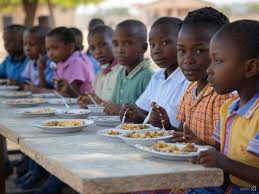The United Nations World Food Programme (WFP) has committed $2.5 billion under its 2023-2027 Nigeria Country Strategy Plan (CSP) to combat hunger and improve nutrition across the country. The initiative aligns with the Sustainable Development Goals (SDGs), particularly SDG 1 (No Poverty) and SDG 2 (Zero Hunger), as part of broader global efforts to eradicate food insecurity.
Speaking at a co-creation workshop in Abuja, organized in collaboration with Nigeria’s National Social Investment Programme Agency (NSIPA), Seriene Loum, WFP’s head of program, emphasized the urgency of addressing food insecurity in Nigeria. Represented by David Stevenson, WFP’s country director, Loum reaffirmed the organization’s commitment to mobilizing resources and working closely with the Nigerian government and other stakeholders to implement the strategy effectively.
The Nigeria CSP, a five-year project running from 2023 to 2027, is designed to strengthen institutional capacities and create an enabling environment to achieve the national target of zero hunger by 2030. The plan includes interventions in food technology, supply chain management, nutrition improvement, and emergency response to food crises.
According to Loum, WFP has structured the program around five core pillars, each targeting food security and improved nutrition. The initiative includes both long-term strategies for food fortification and sustainability, as well as immediate interventions for emergency food assistance to ensure vulnerable populations do not go hungry.
The urgency of WFP’s intervention comes as Nigeria faces an alarming rise in food insecurity. The latest Cadre Harmonisé report, published in October 2024, estimates that around 25 million Nigerians are currently experiencing acute food insecurity. The report warns that this number could rise to 33 million by mid-2025, exacerbating an already dire situation.
Loum noted that Nigeria operates one of Africa’s largest social safety net programs, aiming to lift millions out of poverty. However, with the nation’s economic challenges worsening and vulnerabilities increasing, international cooperation is crucial to achieving tangible progress.
“It is therefore expedient that all stakeholders, most especially WFP, work together with the Federal Government for this very ambitious goal to be achieved,” he stated.
Badamasi Lawal, Chief Executive Officer of NSIPA, emphasized the importance of partnerships in tackling hunger and malnutrition. Represented by Uche Obi, Director of Human Resources Management, Lawal praised WFP for its commitment to supporting Nigeria’s social investment initiatives.
“The WFP’s partnership demonstrates the power of international cooperation and the shared vision of creating a more equitable and prosperous society,” he said.
Lawal highlighted NSIPA’s efforts in addressing poverty and social exclusion through key programmes such as:
– The National Home-Grown School Feeding Programme (NHGSFP), which provides nutritious meals to schoolchildren.
– The Conditional Cash Transfer Programme (NCTO), which supports vulnerable households.
– The Government Enterprise and Empowerment Programme (GEEP), which provides microloans to small businesses.
– The Grant for Vulnerable Groups (GVG, which offers direct financial support to struggling communities.
– The N-Power Programme, which provides job training and employment opportunities for youth.
He noted that WFP’s expertise in food security, nutrition, and emergency response will be instrumental in enhancing these programs and expanding their impact.
As Nigeria grapples with increasing food insecurity, the WFP-NSIPA collaboration represents a significant step toward tackling the crisis. Both organizations have reaffirmed their commitment to leveraging resources, sharing knowledge, and developing innovative solutions to address hunger.
With 2025 projections indicating worsening food insecurity, experts stress the need for sustained government commitment, private sector engagement, and stronger international partnerships to mitigate the crisis and ensure food access for millions of Nigerians.










